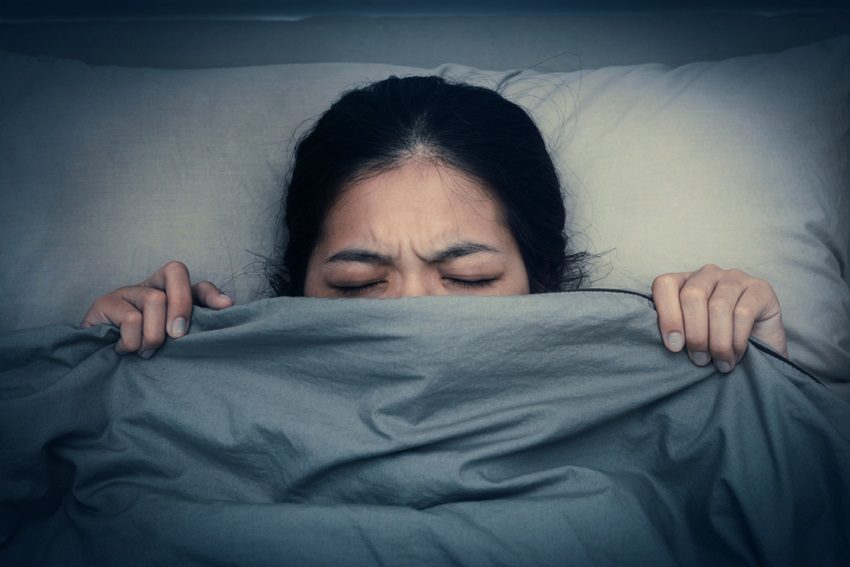The truth about night terrors: Less paranormal and more parasomnia

The terrors experienced during waking, falling asleep and sleep paralysis have more to do with our own biology than ghosts, aliens or monsters, writes Dr Jessica L. Paterson.
Have you ever been drifting off to sleep, or been snapped out of sleep, by the feeling of a malevolent presence, a sense that someone or something is watching you from the shadowy corners of your bedroom? Maybe you have even seen a dark form towering over you. Even more terrifying, you may have felt a painful weight on your chest, making it hard to breathe.
These experiences are common, terrifying, and often attributed to some kind of other-worldly encounter. Your descriptions of these events may have been met with disbelief. But I believe you. Those experiences are real, and they are terrifying. But if you think you are communing with spirits or aliens, you are definitely wrong.
Unusual and unpleasant sensory experiences when waking or nodding off are a form of parasomnia. Parasomnias are sleep disorders characterised by abnormal events that occur when falling asleep, during sleep, or when waking from sleep.
The kinds of hallucinations described above come in two forms; hypnopompic and hypnagogic. Hypnopompic hallucinations occur when you are waking from sleep (hypnopompic comes from the Greek, hypnos for sleep, and pompē for sending away). Hypnagogic hallucinations occur as you are falling asleep (hypnagogic comes from the Greek hypnos for sleep, and agōgos for leading).
Both kinds of hallucinations tend to be visual, but can involve sound, touch, taste, smell, or a sense of motion. They nearly always inspire terror, in that they can be difficult to distinguish from reality. Indeed, a recent paper in the Journal of the Neurological Sciences provides evidence that the monster in Mary Shelley’s Frankenstein was born from a hypnagogic hallucination.
Sometimes hallucinations are experienced concurrently with a temporary paralysis. The sense of being unable to move when waking or falling asleep is sleep paralysis. During REM (rapid eye movement) sleep your body is essentially paralysed. REM is the stage of sleep most often associated with recalled dreams, and muscle paralysis during this time is thought to protect us from physically acting out our dreams. Sometimes though, when you are awoken from REM sleep, the body remains paralysed as though you are still asleep. The experience is said to be akin to a waking death.
In a 1999 interview with the New York Times, parasomnia researcher Professor Allan Cheyne discussed the findings of a large-scale survey investigating experiences of sleep paralysis. Hundreds of respondents likened the experience of sleep paralysis to alien abduction.
Professor Cheyne summarised their various reports: “A sensed presence, vague gibberish spoken in one’s ear, shadowy creatures moving about the room, a strange immobility, a crushing pressure and painful sensations in various parts of the body — these are compatible not just with an assault by a primitive demon but also with probing by alien experimenters … the sensations of floating and flying account for the reports of levitation and transport to alien vessels.’’
While approximately one third of individuals may experience sleep hallucinations or sleep paralysis, they tend to be more common in those who use drugs and alcohol, have mental health issues, or are experiencing anxiety or stress.
For example, the Journal of Clinical Sleep Medicine recently described the case of a 17-year-old girl who, when experiencing distress over her parent’s divorce, started hearing voices when trying to fall asleep. The voices were usually casual, but when she was particularly anxious they became more aggressive.
In some instances, sleep-related hallucinations and sleep paralysis can indicate narcolepsy, a more serious underlying parasomnia. Narcolepsy is a neurological disorder characterised by excessive daytime sleepiness and sometimes also cataplexy: sudden episodes of muscle weakness triggered by strong emotions. Narcolepsy affects approximately 0.05 per cent of the population.
These relatively mundane explanations for what many individuals may have interpreted as extraordinary, other-worldly encounters may come as a relief, or as a disappointment. Put simply, both sleep hallucinations and sleep paralysis may be thought of as aspects of sleep that have leaked into the waking world. They demonstrate the tremendous power of the human mind and give some insight into the secret and spooky world of sleep.
What they do not do is turn your sleep-wake transitions into a situational Ouija board. Ghosts aren’t real. I think.
Dr Jessica L Paterson, Senior Research Fellow, CQUniversity, Appleton Institute